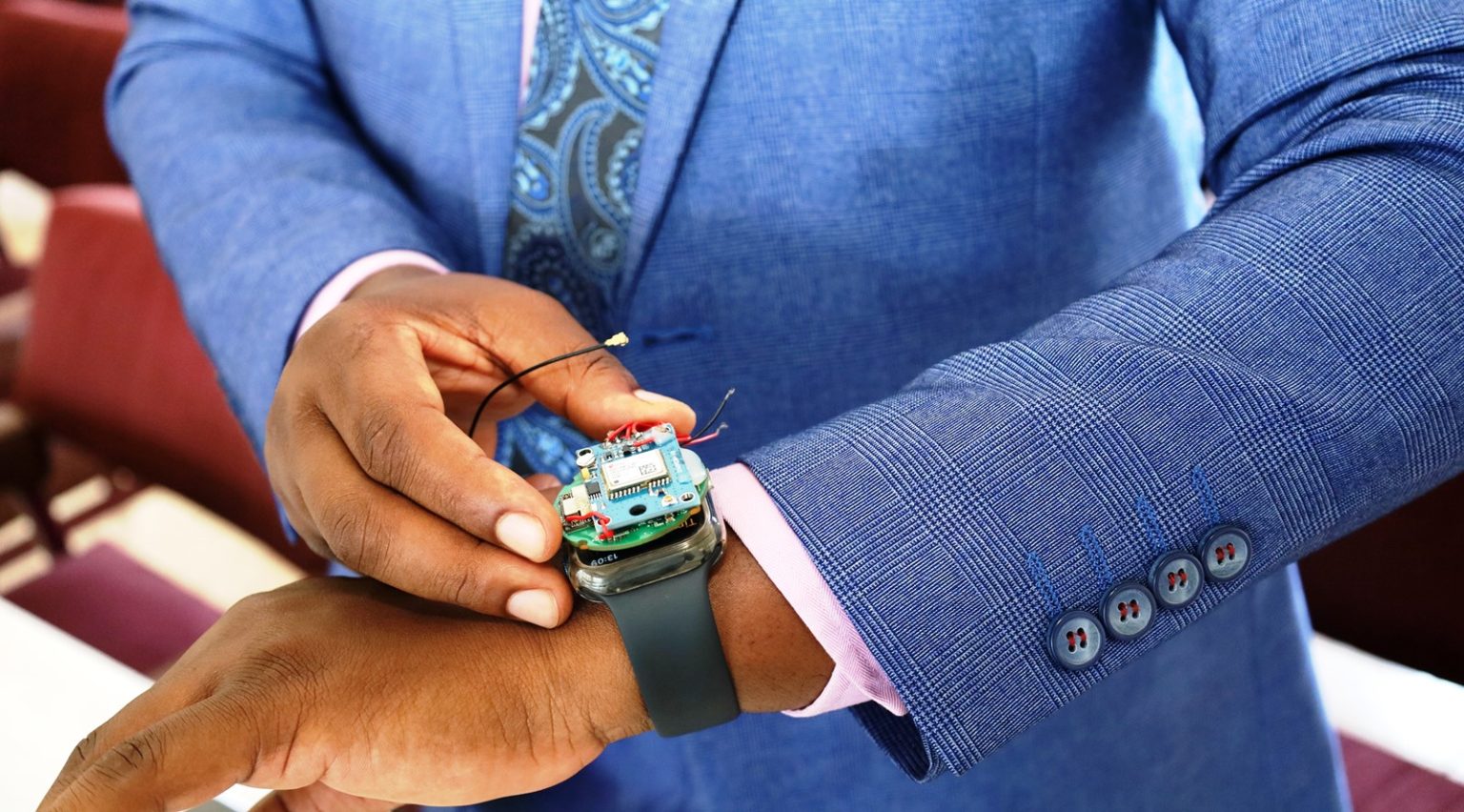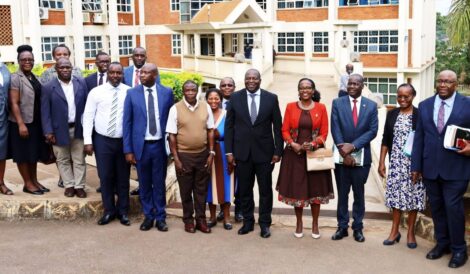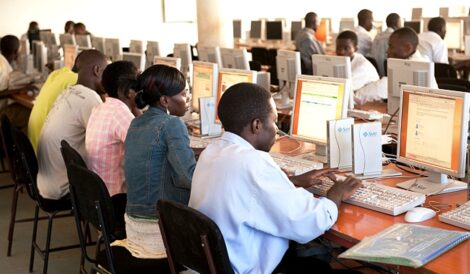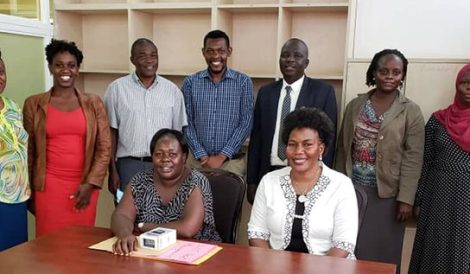Researchers from Makerere University College of Computing and Information Sciences (CoCIS), led by a second-year PhD student Paddy Junior Asiimwe have designed a device to monitor elderly people with dementia and cognitive impairment in rural Uganda.
The device, wearable by the elderly (on the hand like a wrist watch or placed in the pocket), will monitor the patients’ movement and location and then signal the caretaker and the hospital in case of emergencies.
This was disclosed during the research dissemination workshop held on 13th October, 2023 for the Makerere University Research and Innovations Fund (Mak-RIF) project titled, “Advanced Localisation Techniques on Smart Devices for Inclusive Location-based Services: A focus on healthy ageing for the elderly with dementia and mild cognitive impairment in rural communities”
This project relates to the ageing population that wants to live independent of their children or their children work in far away areas.
The Principal Investigator Mr. Paddy Junior Asiimwe noted that the biggest challenge is monitoring the elderly who are living in resource-constrained environments where access to power, internet, network and access to mobile communication is limited. The other challenge is people being not in a position to read and write.
Most available systems on the market according to Asiimwe assume that there is wireless internet everywhere, which is not the case with our local communities, more so in Uganda.

“So we are designing a system that can monitor these elderly people within their homes and still give accurate results with less power consumption, with less cost, within the limited resources that are available in those communities.
The system, Asiimwe explained, basically monitors elderly people remotely using those limited resources that are available in those rural communities.
“Our device uses GPS technology. I would say GNSS or GPS technology because the system we use now has only GPS. This system works in a way that when we first define a safe zone around a user, in technical term, what we are calling a geofence.
When the user or what we are calling an elderly person is within that safe zone, the system does not need to continue tracking him, and then sends an alert to the caretaker or to the hospital in case of emergencies.
But during that time when the user is within the safe zone, we are using what we call a PDR system. In simple terms, we are using accelerometer, gyroscope, and magnetometer to monitor the position of the user within the safe zone.

And GPS is only turned on when the user moves out of the safe zone. In the long run, since GPS is the biggest consumer of power, we end up using less energy because most of the time the system is turned off when the user is within the safe zone.”, The PI said.
Advantages of the device
This technology according to the PI is better than the systems existing on market and would be best recommended for more resource constrained environments, which is the biggest challenge that we have in Uganda as far as accessing resources is concerned.
“One, our system is going to be cheap. Two, our system is going to operate independent of the user. The users that we have mostly in rural areas cannot read and write, and our system operates independent of them.
Three, one of the biggest challenges in these areas is power consumption, which is an assumption that most of these systems on market make, that power is everywhere. So our system can run on batteries, and these batteries, we don’t need to charge them every week, because, for example, from experiments, we tested and the battery can run for 30 days, which is enough time for someone to go and charge,” Mr. Asiimwe explained.
The technology was piloted in Apac district that formed the base for everything that was designed.
“We had a pilot study. We visited that area, met some families, also met the district administrators who took us around. We also met the administrators of the hospital, and we assessed the environment. And even after developing the system, we went back to conduct the tests. And most of the tests that we are basing on now to make results, were done in Apac district”.Asiimwe said.

Apac, according to the Principal investigator, is one of those districts in Uganda that are less developed and, with the biggest number of elderly people and more so those with dementia. In addition, the research team could easily access other projects that are already done by Makerere, like CityLab, which is already putting internet in Apac, plus some other projects that are running from Makerere that gave a foundation upon which to build the project.
After perfecting the performance of this prototype and, with more funding, the research team hopes to add more sensors to these device. For example, elderly people face the challenge of falling down. So, the team would love to add sensors that can detect when a person has fallen down, which is something very challenging, especially in our communities because people have died in bathrooms as a result of these falls.
The team also looks forward to more funding to add in more sensors to monitor more things like temperature, heartbeat, and other body functions, because the network will be in place to send the information to the caretakers.
“And then the other thing that we can also look at, for example, we had this years’ challenge of COVID. It can also be used for patients for COVID. For example, we want to know, since we were fearing to be near COVID patients, we would use this technology to monitor them within their homes. And that is one thing that we can easily integrate with this system in case there is another outbreak in the near future, God forbid, our system could be a solution “, Asiimwe said
The system can do a lot more like monitoring children in this era of child trafficking among other challenges.
Scientists must do their best beyond the minimum expectation-Prof. Oyana
Presiding over the workshop, the Principal College of Computing and Information Sciences Prof. Tonny Oyana challenged researchers and staff to go beyond certain university metrics that they are expected to meet like publishing two papers for a PhD.
Oyana cautioned scientists not to be taken up by the two papers or publishing for purpose of promotion saying, what excites a good scientist is harvesting many papers and grants.

He advised Ugandans to emulate some universities around the world where scientists write five papers per year. With Uganda’s population of over 40 million people. Professor Oyana urged scientist to go beyond the standard and, the minimum if they are to remain competetive on the Ugandan and world market.
“So please, the work of a scientist is to do your best to be at your best to be optimum. Do four papers, five papers, why not? Remember that if you decide to become a scientist, you should have more. Be excited. Don’t do the minimum. If you set your standard here and you fall here, that’s good, but don’t set your standard too low.” The Principal advised.
Over 1,000 projects funded by Mak-RIF
Representing the Chair Grants Management Committee, the Mak-RIF Engagement Officer Grace Ruto-Cherotich, expressed delight and pride in the fact that the team had been able to reach the dissemination part of the project.
She said the Government of Uganda has taken keen interest in how different institutions of higher learning are contributing to national development.
“So the Mak-RIF was created with the objective of increasing generation of local research and scalable innovations that are specifically meant to impact national development. As Uganda, we have our national development plan. We are committed to the Sustainable Development Goals (SDGs) and so many other international treaties that we have signed as a nation”, she said.
Since the birth of the research and Innovation fund at Makerere, Cherotich said, so far over a thousand projects have been funded. She expressed the need for the PI to patent his product.
“We need to protect it so that by the time we introduce it to the stakeholders out there, it is already safeguarded”
She commended the research team for the multidisciplinary approach, bringing on board doctors engineers and the ICT department adding that, it is one of the Mak-RIF core values and principles.
“We want to see the multidisciplinary aspect because now this is an institution that has, or nurtures different skill sets. We have humanities, we have ICT, we have engineering, and we have medicine. So we want to see how we can leverage all those different opportunities we have, all the different colleges we have, to ensure that we build beautiful things that will cause impact to the nation.” Cherotich stressed.

She said that the Mak RIF research agenda is derived from the national development plan and SDGs with its own internal market area strategic plan focusing on the institution being a research-led, meaning that there is need to put a lot of effort in terms of research and innovations.
In that particular research agenda, she said Mak-RIF has 14 thematic areas and recently did an analysis of which areas in those particular themes have not been focused on much.
Cherotich reported that the thematic area that focuses on public service and productivity of public servants has not really been researched, yet recent discussions with Permanent Secretary, Ministry of Public Service revealed that Government has made progress in terms of increasing or raising the salary for scientists. However, the result of that is that people are resigning, leaving their jobs to quickly get their pension and start their private business.
“So you ask yourself, where have we gone wrong in the decisions we make as a nation?
Because now that will mean that there’s going to be a very high pension budget, and then you’re going to have less productivity in the workplace. You’re even going to have reduced numbers of civil servants serving in those particular dockets of increased salaries”, she decried.
She implored researchers to do a lot of detailed research and come up with innovations to achieve what is positively impacting the nation.
The engagement officer equally commended the PI for the job well done.
“Paddy has done a lot of work in harnessing ICT to drive development and that is our theme number 11. I want to tell Paddy that we are really, really humbled and at the same time excited that we have a result, we have a product out of the work we have funded at the Research and Innovations Fund.
“And for sure, we currently have the Innovations Hub at the College of Business and Management Sciences (CoBAMS), which is also funded by Mak-RIF, and focused on commercialization and scaling up of projects that we have already, to help us realize returns on investment. So it’s a good opportunity for you”. She appreciated and said:

“You know, there’s RIF-5 ongoing. So depending on what you would like to do going forward, do you want to focus on IP issues? Do you want to focus on collecting more data to prove that this device actually works? We can monitor and write reports and stories. And I also want to thank you very much for the fact that you have been able to publish. So those are some of the things we can highlight on the Mak-RIF website so that everybody gets to know that there has been good work done out of certain projects.”
Cherotich also notified the team of the availability of an Intellectual Property Management Office also funded by Mak-RIF that works with the Uganda Registration Services Bureau (URSB) to ensure that IP issues are catered for, as the only way the university can protect her innovations. She urged the research team to think of how they are going to ensure that their IP is protected.
She explained that Government gives Mak-RIF UGX 30 billion every financial year. In addition she said, Mak RIF has other opportunities on offer including competitive grants, multi-year projects, needs-based track, and the PhD track that have been introduced available for Makere University staff and students.
“We have the research support office that guides you through the processes of what you need to do when you have been awarded, and what happens post-award. They take you through contract signing processes, requisitioning processes, and procurement processes.
“We also support you when it comes to issues to do with report writing. We have quarterly reports, and ultimately the final reports. We also have the station where we are right now. We also support the whole process of dissemination. How would you want your dissemination done? How would you do your slides laid out? etc”, she added.
Cherotich advised the research team on the need to involve important stakeholders that can embed their work into the policy environment of the country, or where need be, scale it up beyond the scale of what the Mak-RIF grants facilitate.




